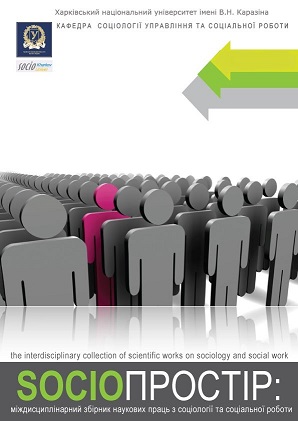Professional competences of social workers: changing priorities in the conditions of war
Abstract
The problem of providing personnel with the appropriate competence of social services in the conditions of martial law remains relevant for Ukraine. It is predicted that under the influence of the general labor shortage caused by the war, the problem of shortage of specialists in the field of social work may arise. The author of the article emphasizes that, as of now, the distribution of specialists in the field of social work is uneven across the regions of Ukraine and has not reached a critical state, but requires special attention of scientists and practitioners. In recent years, the list and formation of competencies of social workers has been the focus of attention of scientists in the context of professional and educational standards. The realities of wartime changed the conditions and practices of social work, accordingly shifting the emphasis in the required competencies. The purpose of the article is to analyze the trends and factors affecting the required competences of social workers, thereby intensifying the scientific discussion on reformatting professional and educational standards. The author considers competence as a characteristic that determines the specialist's ability to solve professional tasks, using knowledge, life and professional experience, relying on one's own
values and abilities.
The competencies of a social worker are considered in the context of modern practices of social services in Ukraine. The author identifies the main trends in the change in the composition of social workers: the appearance of employees physically injured as a result of hostilities (killed, missing, injured); an increase in the share of employees who migrated abroad or moved within the country; increase in the number of employees with disabilities of various nature. In the author's opinion, changes in the requirements for the competence of a social worker are influenced by the demand of the labor market, so he examines the proposals that are relevant in the Kharkiv region. Considering the professional skills in demand, the author concludes that employers are paying more attention to «soft skills», although the requirements for a diploma, work experience, language and computer skills remain unchanged. The conditions of the war actualized the requirements for the ability to work under pressure, in difficult conditions, to analyze risks and threats. Employers now consider stress resistance to be an equally important advantage. Summarizing, the author notes that the professional standard after the war will need adjustment and suggests focusing on the European standard
Downloads
References
/References
Andryushchenko, A., Gorbunova-Ruban, S. (2019). Training of social workers in Ukraine: problems and ways to solve them. SOCIOPROSTIR, 8, 35–40. Retrieved from https://periodicals.karazin.ua/socioprostir/article/view/12776.
Baidarova, O., Karagodina, O., Fedchenkov, V. (2020). Does the model of professional competences meet the needs of specialists in the field of protection of children's rights and interests in Ukraine? Bulletin of the Academy of Labor, Social Relations and Tourism, 1, 80-96.
State Employment Center. Analytical and statistical information. Retrieved from https://www.dcz.gov.ua/analitics/67.
Ilinich, S. Yu., Lyashkova, N. O. (2016). Professional competence of specialists in the social sphere as a socio-didactic problem. Collection of scientific works of Kamianets-Podilskyi National University named after Ivan Ohienko. Series: Social and pedagogical, 26. 85-97.
Pyshchulina, O., Markevich, K. (2022). The labor market in the conditions of war: main trends and directions of stabilization. Analytical note. Kyiv. Retrieved from https://razumkov.org.ua/images/2022/07/18/2022-ANALIT-ZAPIS-PISHULINA-2.pdf.
Semigina, T. V., Pozhidayeva, O. V. (2020). Formation of competences of social workers: international and local practice. Representation of educational achievements, mass media and the role of philology in the modern system of sciences: a collective scientific monograph (рр.47–63).Vinnytsia.
Europeran Union (2017). The European Qualifications Framework (EQF). Retrieved from https://europa.eu/europass/en/european-qualifications-framework-eqf.
Андрющенко А., Горбунова-Рубан С. Підготовка соціальних працівників в Україні: проблеми та шляхи їх вирішення. SOCIOПРОСТІР. 2019. № 8. С. 35–40.
URL: https://periodicals.karazin.ua/socioprostir/article/view/12776 (дата звернення: 08.11.2022).
Байдарова О., Карагодіна О., Федченков В. Чи відповідна модель професійних компетентностей потребам фахівців сфери захисту прав та інтересів дітей в Україні? Вісник Академії праці, соціальних відносин і туризму. 2020. № 1. С. 80–96.
Державний центр зайнятості. Аналітична та статистична інформація.
URL: https://www.dcz.gov.ua/analitics/67 (дата звернення: 09.11.2022).
Ілініч С. Ю., Ляшкова Н. О. Професійна компетентність фахівців соціальної сфери як соціодидактична проблема. Збірник наукових праць Кам’янець-Подільського національного університету імені Івана Огієнка. Серія : Соціально-педагогічна. 2016. № 26. С. 85–97.
Пищуліна О., Маркевич К. Ринок праці в умовах війни: основні тенденції та напрями стабілізації. Аналітична записка. Київ, 2022. URL: https://razumkov.org.ua/images/2022/07/18/2022-ANALIT-ZAPIS-PISHULINA-2.pdf (дата звернення: 07.11.2022).
Семигіна Т. В., Пожидаєва О. В. Формування компетентностей соціальних працівників: міжнародна та локальна практика. Репрезентація освітніх досягнень, мас-медіа та роль філології у сучасній системі наук : колективна наукова монографія. Вінниця, 2020. С. 47–63.
Europeran Union (2017). The European Qualifications Framework (EQF).
URL: https://europa.eu/europass/en/european-qualifications-framework-eqf (дата звернення: 12.11.2022).

